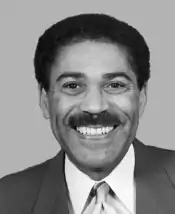Bill Clay
William Lacy Clay (born April 30, 1931) is an American politician from Missouri. As Congressman from Missouri's first district, he represented portions of St. Louis in the U.S. House of Representatives for 32 years.
Bill Clay | |
|---|---|
 | |
| Member of the U.S. House of Representatives from Missouri's 1st district | |
| In office January 3, 1969 – January 3, 2001 | |
| Preceded by | Frank M. Karsten |
| Succeeded by | Lacy Clay |
| Personal details | |
| Born | William Lacy Clay April 30, 1931 St. Louis, Missouri, U.S. |
| Political party | Democratic |
| Spouse(s) | Carol Johnson (m. 1953) |
| Children | 3, including Lacy |
| Education | Saint Louis University (BS) |
Early life and family
Clay was born in St. Louis, Missouri, the son of Luella S. (Hyatt) and Irving Charles Clay.[1] He graduated from Saint Louis University. Clay served in the United States Army from 1953 to 1955, and he was a St. Louis alderman from 1959 to 1964. Clay served 105 days in jail for participating in a civil rights demonstration in 1963. Prior to entering Congress, Clay held jobs first as a real estate broker and later as a labor coordinator. He worked for the union of St. Louis city employees from 1961 to 1964 and then with a Steamfitters Union until 1967.
Clay married Carol Ann Johnson in 1953. They had three children, including William Lacy Clay Jr., who would succeed his father in the U.S. House.[2][3]
Politics
Clay was elected to the House of Representatives as a Democrat in 1968. He became an advocate for environmentalism, labor issues, and social justice. Clay faced ethics charges in the 1970s for billing the government on auto trips while flying on airlines, and the House banking scandal revealed that Clay had 328 overdrafts. This can be misleading, however, as House checks did not bounce; they were honored because the House Bank provided overdraft protection to its account holders, and the Office of the Sergeant at Arms covered the House Bank with no penalties. In 1993, Clay helped to pass the Family and Medical Leave Act.
From 1991 until the Democrats lost control of Congress in 1995, Clay chaired the House Committee on the Post Office and Civil Service. In 2000, he retired from the House and his son Lacy Clay succeeded him.
Honors
In 1996, the William L. Clay Center for Molecular Electronics (now the Center for Nanoscience) was dedicated in his honor on the campus of the University of Missouri-St. Louis.
Clay is also the founder of the William L. Clay Scholarship and Research Fund, which awards college scholarships to high school seniors living in Missouri's first congressional district. The Fund, which is a 501(c)3 organization, has awarded scholarships since 1985.
Poplar Street Bridge, which connects St. Louis, Missouri, and East St. Louis, Illinois, was renamed on October 7, 2013, Congressman William L. Clay Bridge.[4]
William L. Clay has a star and informative biographical plaque on the St. Louis Walk of Fame.[5]
Works
Clay has written several works of non-fiction.
- To Kill or Not to Kill: Thoughts on Capital Punishment (1990) ISBN 0-89370-331-1
- Just Permanent Interests: Black Americans in Congress, 1870–1991 (1992) ISBN 1-56743-000-7
- Racism in the White House: A Common Practice of Most United States Presidents (2002) ISBN 0-88258-206-2
- Bill Clay: A Political Voice at the Grass Roots (2004) ISBN 1-883982-52-9 Designed by Steve Hartman of Creativille, Inc. Creativille, Inc. - Be Simple. Be Passionate. Be Creative.
- The Jefferson Bank Confrontation (2008) ISBN 0-944514-34-0
References
- "Lacy Clay ancestry". freepages.rootsweb.com.
- "Clay, William Lacy 1931–". Contemporary Black Biography. Encyclopedia.com. 2005. Retrieved August 5, 2018.
- "CLAY, William Lacy, Sr". United States House of Representatives Office of the Historian. Retrieved August 5, 2018.
- St. Louis Walk of Fame. "St. Louis Walk of Fame Inductees". stlouiswalkoffame.org. Archived from the original on 31 October 2012. Retrieved 25 April 2013.
External links
- Biographic sketch at U.S. Congress website
- The History Makers
- The William L. Clay Scholarship and Research Fund
- Appearances on C-SPAN
| U.S. House of Representatives | ||
|---|---|---|
| Preceded by Frank M. Karsten |
Member of the U.S. House of Representatives from Missouri's 1st congressional district 1969–2001 |
Succeeded by Lacy Clay |
| Preceded by William D. Ford |
Chair of House Civil Service Committee 1991–1995 |
Position abolished |
